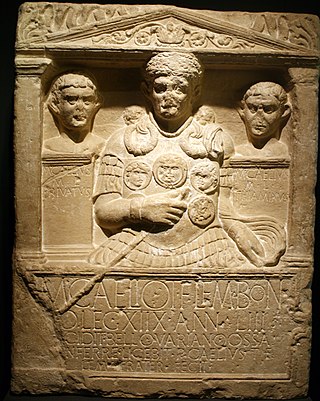Related Research Articles
Maroboduus, also known as Marbod, was a king of the Marcomanni, who were a Germanic Suebian people. He spent part of his youth in Rome, and returning, found his people under pressure from invasions by the Roman Empire between the Rhine and Elbe. He led them into the forests of Bohemia, near to the Quadi who already lived nearby, and established a large alliance.

Year 27 BC was either a common year starting on Sunday, Monday or Tuesday or a leap year starting on Monday of the Julian calendar and a common year starting on Sunday of the Proleptic Julian calendar. At the time, it was known as the Year of the Second Consulship of Octavian and Agrippa. The denomination 27 BC for this year has been used since the early medieval period, when the Anno Domini calendar era became the prevalent method in Europe for naming years.

AD 14 (XIV) was a common year starting on Monday of the Julian calendar. At the time, it was known as the Year of the Consulship of Pompeius and Appuleius. The denomination AD 14 for this year has been used since the early medieval period, when the Anno Domini calendar era became the prevalent method in Europe for naming years.

The 10s decade ran from January 1, AD 10, to December 31, AD 19.
AD 4 was a common year starting on Wednesday or a leap year starting on Tuesday of the Julian calendar and a leap year starting on Tuesday of the Proleptic Julian calendar. In the Roman Empire, it was known as the Year of the Consulship of Catus and Saturninus. The denomination "AD 4" for this year has been used since the early medieval period, when the Anno Domini calendar era became the prevalent method in Europe for naming years.
6 was a common year starting on Friday of the Julian calendar. In the Roman Empire, it was known as the Year of the Consulship of Lepidus and Lucius Arruntius. The denomination "AD 6" for this year has been used since the early medieval period, when the Anno Domini calendar era became the prevalent method in Europe for naming years.
AD 13 (XIII) was a common year starting on Sunday of the Julian calendar. At the time, it was known as the Year of the Consulship of Silius and Plancus. The denomination AD 13 for this year has been used since the early medieval period, when the Anno Domini calendar era became the prevalent method in Europe for naming years.
The 0s BC is the period between 9 BC and 1 BC, the last nine years of the before Christ era. It is one of two "0-to-9" decade-like timespans that contain nine years, along with the 0s.
AD 88 (LXXXVIII) was a leap year starting on Tuesday of the Julian calendar. At the time, it was known as the Year of the Consulship of Augustus and Rufus. The denomination AD 88 for this year has been used since the early medieval period, when the Anno Domini calendar era became the prevalent method in Europe for naming years.
AD 92 (XCII) was a leap year starting on Sunday of the Julian calendar. At the time, it was known as the Year of the Consulship of Augustus and Saturninus. The denomination AD 92 for this year has been used since the early medieval period, when the Anno Domini calendar era became the prevalent method in Europe for naming years.
This article concerns the period 29 BC – 20 BC.

Year 1 BC was a common year starting on Friday or Saturday in the Julian calendar and a leap year starting on Thursday in the proleptic Julian calendar. It was also a leap year starting on Saturday in the Proleptic Gregorian calendar. At the time, it was known as the Year of the Consulship of Lentulus and Piso. The denomination 1 BC for this year has been used since the early medieval period when the Anno Domini calendar era became the prevalent method in Europe for naming years. The following year is AD 1 in the widely used Julian calendar and the proleptic Gregorian calendar, which both do not have a "year zero".
Year 7 BC was a common year starting on Saturday or Sunday of the Julian calendar and a common year starting on Thursday of the Proleptic Julian calendar. In the Roman world, it was known as the Year of the Consulship of Tiberius and Piso. The denomination 7 BC for this year has been used since the early medieval period, when the Anno Domini calendar era became the prevalent method in Europe for naming years.
Year 9 BC was either a common year starting on Wednesday, Thursday or Friday or a leap year starting on Thursday of the Julian calendar and a leap year starting on Monday of the Proleptic Julian calendar. At the time, it was known as the Year of the Consulship of Drusus and Crispinus. The denomination 9 BC for this year has been used since the early medieval period, when the Anno Domini calendar era became the prevalent method in Europe for naming years.
Year 45 BC was either a common year starting on Thursday, Friday or Saturday or a leap year starting on Friday or Saturday and the first year of the Julian calendar and a leap year starting on Friday of the Proleptic Julian calendar. At the time, it was known as the Year of the Consulship of Caesar without Colleague. The denomination 45 BC for this year has been used since the early medieval period, when the Anno Domini calendar era became the prevalent method in Europe for naming years.
Year 30 BC was either a common year starting on Wednesday, Thursday or Friday or a leap year starting on Thursday of the Julian calendar and a common year starting on Wednesday of the Proleptic Julian calendar. At the time, it was known as the Year of the Consulship of Octavian and Crassus. The denomination 30 BC for this year has been used since the early medieval period, when the Anno Domini calendar era became the prevalent method in Europe for naming years.
Year 28 BC was either a common year starting on Saturday, Sunday or Monday or a leap year starting on Saturday or Sunday of the Julian calendar and a common year starting on Saturday of the Proleptic Julian calendar. At the time, it was known as the Year of the First Consulship of Octavian and Agrippa. The denomination 28 BC for this year has been used since the early medieval period, when the Anno Domini calendar era became the prevalent method in Europe for naming years.

Year 16 BC was either a common year starting on Monday, Tuesday or Wednesday or a leap year starting on Monday or Tuesday of the Julian calendar and a common year starting on Sunday of the Proleptic Julian calendar. At the time, it was known as the Year of the Consulship of Ahenobarbus and Scipio. The denomination 16 BC for this year has been used since the early medieval period, when the Anno Domini calendar era became the prevalent method in Europe for naming years.

Year 17 BC was either a common year starting on Sunday or Monday or a leap year starting on Saturday, Sunday or Monday of the Julian calendar and a leap year starting on Friday of the Proleptic Julian calendar. At the time, it was known as the Year of the Consulship of Furnius and Silanus. The denomination 17 BC for this year has been used since the early medieval period, when the Anno Domini calendar era became the prevalent method in Europe for naming years.

The 0s began on January 1, AD 1 and ended on December 31, AD 9, covering the first nine years of the Common Era. It is one of two "0-to-9" decade-like timespans that contain nine years, along with the 0s BC.
References
- ↑ 7, 1, 3, p. 290; Marcus Velleius Paterculus, Compendium of Roman History 2, 108
- ↑ "Maroboduus". britannica.com. Encyclopædia Britannica, inc. March 20, 2016. Retrieved June 21, 2020.
Maroboduus, (died AD 37, Ravenna, Italy), king of the Marcomanni who organized the first confederation of German tribes.
- ↑ "Arminius". Encyclopædia Britannica Ultimate Reference Suite . Chicago: Encyclopædia Britannica. 2014.
- ↑ Durschmied, Erik (April 11, 2013). The Weather Factor. Hodder & Stoughton. p. 1759. ISBN 978-1-4447-6965-4.
- ↑ "LacusCurtius • Res Gestae Divi Augusti (II)". penelope.uchicago.edu. Retrieved February 22, 2017.
- ↑ Preserved by Macrobius, Saturnalia 1.12.35; entry on calendarium, in William Smith, A Dictionary of Greek and Roman Antiquities (John Murray, London, 1875), at LacusCurtius.
- ↑ Grant, Michael. "Horace". Encyclopaedia Britannica. Retrieved February 22, 2024.